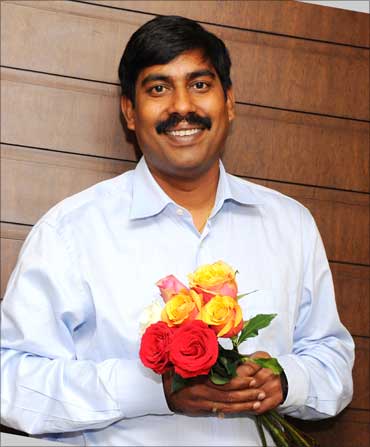
He is the world's largest exporter of roses. His company has leased 3,000 sq km of land (that is five times bigger than Mumbai, which is 603.4 sq km in size!) in Ethiopia. Here is his amazing story...
After completing his engineering and MBA, it was but natural for Sai Ramakrishna Karuturi to join his family business. A three-year stint and he realised that he wanted to explore new pastures and not stick to his father's business.
After toying with various options he finally settled for floriculture -- he decided to cultivate and export roses.
But cultivating flowers in India is an expensive affair. After a chance meeting with a former colleague he moved to Africa, where the seeds of his fortune were sown.
With 15 per cent of the global market in his grasp, Karuturi, today, is the world's largest exporter of roses.
Three years ago, he added agriculture to his bandwagon. Today, his company Karuturi Global Ltd has 3,000 sq km of agricultural land in Ethiopia (that is 5 times the size of Mumbai!) and 239 hectares of land for rose cultivation.
The company's turnover in 2009 was Rs 650 crore (Rs 6.5 billion).
Here's his story in his own words:
The beginning
Since I come from a business family, entrepreneurship was the only option open to me. My father, though he is 76 years old, still runs many businesses, including power transmission. It was like I was in a business school from age three!
After I completed engineering, I went on to do MBA in the United States. While my father taught me the essence of business, the management degree added a structured dimension to the existing knowledge and taught us all about supply chain and marketing.
I came back and joined the family business and worked with my father from 1990 to 1993.
...
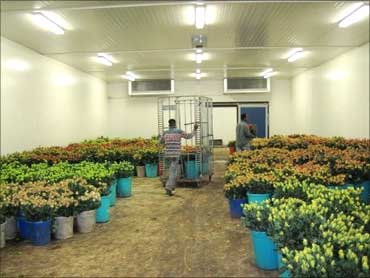
Starting own enterprise- the flower business
In 1994, I zeroed in on the flower business. I was immensely influenced by management guru Michael Porter's theory of 'Sustainable Competitive Advantage'. I was looking at any business that has sustainable competitive advantage from India into the global market.
I never looked at a business that supplied into India or into a particular region. I wanted to start an enterprise that would sustain itself globally. I was looking at a variety of businesses and the flower business appealed to me the most.
When I visited Israel, I perceived the enormity of the flower businesses, and it left a mark on me. I fell in love with this business, and my passion for it has not dimmed in all these years.
I started with a shoe-string budget of Rs 133,000 which was what I had in my bank account then. Bank loans were easy to get for this sector and many others were also getting into the business with crores of rupees. Then, my father gave me a seed capital of Rs 50 lakh (Rs 5 million). I approached IDBI and they sanctioned Rs 5 crore (Rs 50 million).
I completed the project by 1996. I bought around 28 acres of land in Doddabellapur, 40 km from Bengaluru, and built a couple of green houses.
Mind you, I did not import them. I got my green houses built on the footpaths of Bengaluru, literally. They were designed by the Indian Institute of Science. I bought steel from the market and got it fabricated at a roadside workshop. We made it at a third of the cost at which our competitors were importing it.
When our competitors were importing rose shrubs at Rs 80 per plant, I got them from the local nurseries. They wanted me to import the basic bud wood so that they could make the varieties here in Bengaluru itself. I got them imported from Germany and Holland and it cost me only Rs 5 a plant.
The building block of our success started with frugality and the Indian way of stretching the rupee thin. Our capital and revenue costs were kept very low.
I built this business on very strong foundations of keeping costs low and that has helped us reach where we are today!
...
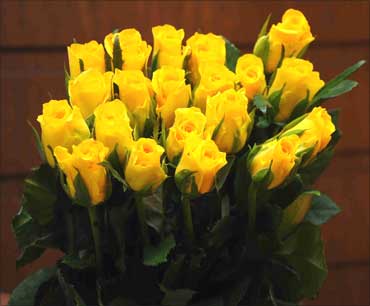
Roses to the global market
When I started the business, I never thought of looking at the Indian market as the consumption pattern here did not favour this kind of product. But, now, I stand significantly corrected.
Today, the Indian market is very, very important to us. As a matter of fact, the flowers that we grow in Bengaluru are hardly exported and sold mostly within the country.
We have our own retail chain, the Flower Express, and franchisees in all the major cities like Chennai, Bengaluru, Delhi, Hyderabad, and Mumbai. And they are all doing very well.
The Indian consumer has evolved into a consumerist model and they don't flinch at the idea of spending on flowers.
When we started, people preferred buying a stainless steel tiffin case worth Rs 50 rather than buying a bouquet, as a gift. But things have changed and flowers have become a serious gifting option. However, it is still an urban upper middle class phenomenon.
Our first overseas destination was Holland, as it was 'the' market at that time. The first export was not entirely disappointing and it was not exhilarating either. It was a mixed bag. Initially the profits were low and the first one or two years went by in establishing our credibility and exploring the right markets.
Soon, we were exporting to Japan, Taiwan, Hong Kong, Germany, Singapore, Canada, the US, Malaysia, Italy, the United Kingdom, the Netherlands, Australia, Brunei, and the Middle East. I travelled a lot to get connected to all these markets. Australia was a big challenge but it proved to be a very lucrative market.
During the European summer, when the prices are weak, Australia helps us. Singapore is an advantage because of the proximity and the lower cost of freight. For a long time, the Singapore market sustained our business. We don't supply to Singapore any more because it's too small a market for us now.
The Middle East has become a very big market. The regional market is so huge that I don't think anybody is seriously exporting to the European market from India. We are not competitive to Europe. That was why the second phase of my journey started with exploring Africa.
...

Moving to Africa
We had about 10 hectares of farmland in India and we had reached about Rs 4-5 crore (Rs 40-50 million) of sales when I thought of expanding our horizon.
I found that we were not competitive in Europe because they had an import duty on Indian products which our competitors from Africa didn't have to suffer from. So, they had a 9 per cent cost advantage.
Freight costs were also lower. They were paying 25 per cent to 30 per cent lower airfare than what we were paying to Europe. We just couldn't compete with Africa. We looked all over India but could not get contiguous land.
So, in 2000, I decided to move to Africa. The idea came to me when I bumped into a former manager of ours who had migrated to Africa. Till then, Africa was a faraway land where somebody was doing something.
When I went to Africa, I was astounded by the scale, the profitability and the sustainability of the business. I realised we had a 40 per cent cost advantage there.
...
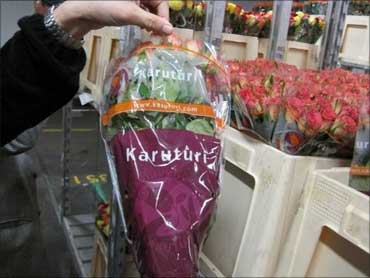
Units in Ethiopia and Kenya
I decided to set up a unit in Ethiopia in 2004. The Ethiopian ecosystem was quite welcoming. It was easier buying land there than in India. I started with Rs 18 lakh (Rs 1.8 million) and it was like testing the waters. By the end of the first year, we had invested Rs 7 crore (Rs 70 million). Over the years we went on investing in land and today, we have close to $170 million invested there.
We are now the world's largest rose company. We produce one-and-a-half million stems of roses every day in Ethiopia and Kenya together. We employ about 9,000 people there and 1,000 here in India.
In Africa, we run our own hospitals, schools and football clubs. We employ only the locals. We take good care of them and they take good care of our business.
Today, we have a 9 per cent market share in Europe and we are heading for a 15 per cent market share as we are doing a lot of expansion.
Today, we produce 650 million roses a year, which is about 2 million roses a day. We are looking for a billion rose stem capacity! Every day, we send one charter flight from Africa to Europe.
The Indian production goes mainly to the Indian market. We don't export from India any more. Today, 95 per cent of our production is in Africa. So, I spend 15 days a month in Africa.
We harvest roses five times a day and process them the same day. They are despatched early next morning, and they reach the destination by the end of the day. They are sold on the third day.
...
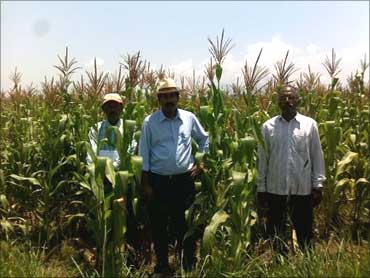
Moving to agriculture
Three years ago in 2007, we decided to buy land in Ethiopia for agriculture. Today, we have 3,000 sq km of land which is 5 times the size of Mumbai, and it makes us one of the world's largest landlords! I never thought of becoming a landlord, much less one of the world's largest. That was not a goal at all.
We harvest rice, maize, vegetables, palm oil, and sugarcane. We produce about 5 million tonnes of rice which we export to many countries. That is about one per cent of the world's rice production and 20 per cent of the traded volume in the global market.
We also hope to be a significant player in the maize, sesame, soya and sorghum markets. Palm oil also will be produced in around 100,000 hectares and we will be one of the top five palm oil producing companies.
We have already been rated by UNCTAD (United Nations Conference on Trade and Development) as a member of the 25 largest transnational corporations in agriculture. I want to be ranked among the top 5 and make every Indian proud that one of their own has reached the heights, not in IT but in agriculture.
...
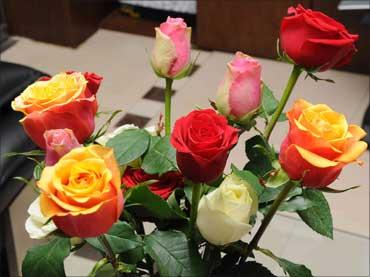
Future plans
Though horticulture is the main driver of our business, in the next 24 months, agriculture will be twice as big as horticulture.
We expect incremental revenues from agriculture to go past $600-700 million and I don't see horticulture revenues going past $200 million (it is currently $150 million).
My target is to take this company to the billion-dollar club by 2015. So, the next five years' journey is going to be very enjoyable and fulfilling.
Advice to entrepreneurs
My advice to young entrepreneurs is that there is no substitute for hard work and passion. If you are passionate about your work, you can excel in it. You cannot just be passionate and not be hard working; they go hand in hand.